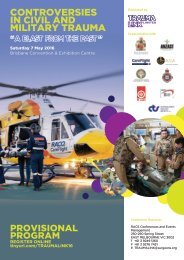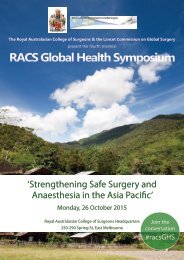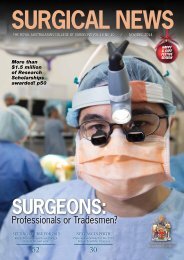You also want an ePaper? Increase the reach of your titles
YUMPU automatically turns print PDFs into web optimized ePapers that Google loves.
RELATIONSHIPS<br />
AND ADVOCACY<br />
AUSTRALASIAN<br />
ADVOCACY<br />
RACS successes are already<br />
accumulating for 2016<br />
We may only be in the first quarter of the year, but already<br />
RACS has achieved significant advocacy success in 2016.<br />
As many of you will have witnessed first-hand, the number<br />
of hospitalisations relating to alcohol misuse continues<br />
to represent a substantial and concerning proportion of<br />
the surgical workload. RACS has advocated against the<br />
harmful effects of alcohol for many years, not only for the<br />
increased risk of complication that it poses to surgical<br />
patients, but also for the broader ramifications it has on the<br />
sustainability of our public health system and society as<br />
a whole. Governments and policy makers are increasingly<br />
recognising the link between alcohol misuse and health<br />
costs, and the need to mitigate these risks by introducing<br />
sensible legislation.<br />
RACS has supported the New South Wales Government<br />
for its courageous stance, despite ongoing and often alarmist<br />
opposition from the alcohol industry. We have publically and<br />
privately supported them, and urged other governments to<br />
follow suit. In February our efforts were rewarded when the<br />
Queensland Parliament passed similar legislation.<br />
In the lead up to this major policy change, RACS-Qld<br />
worked with Labor MP and maxillofacial surgeon Dr<br />
Anthony Lynham and the Queensland Government to<br />
highlight why change was necessary. In 2014/15, there were<br />
11,241 alcohol-related emergency department presentations<br />
found not just in major population centres, but across<br />
Queensland. They affected individuals, families and<br />
communities with 30 per cent of Queenslanders impacted in<br />
some way by alcohol related violence.<br />
RACS expertise on this issue was noticed by other<br />
jurisdictions. In the weeks following the passing of the<br />
Queensland legislation, the College was contacted by ABC<br />
Darwin radio. The producers ran a week-long discussion on<br />
their morning program about whether similar laws would<br />
benefit the Northern Territory. Fellows John Crozier and<br />
Mahiban Thomas were invited on to the show along with<br />
other medical and police experts. We were also invited by<br />
the South Australian Government to meet with the Hon<br />
Tim Anderson QC, to inform an independent review of that<br />
state’s liquor licensing framework.<br />
GRAEME CAMPBELL<br />
Vice President<br />
New measures come into effect in April in the Thames<br />
Coromandel district of New Zealand with the introduction<br />
of earlier closing times for bars and liquor outlets in an<br />
effort to limit the negative impact that alcohol has on their<br />
community. The new rules that require off-licences to close<br />
at 9pm and on-licences at 1am, and allow for one-way<br />
door policies to be imposed at the discretion of the alcohol<br />
licensing authority, are part of a two staged introduction that<br />
commenced in January. Again this followed strong RACS<br />
advocacy on alcohol-related harm and sets a positive example<br />
for other district councils across the country to follow.<br />
In addition to our alcohol advocacy success, RACS has<br />
made significant progress in securing ongoing funding for<br />
the Australian Trauma Registry (ATR). Without the ATR,<br />
Australia has no way of measuring the number of serious<br />
injuries due to road crashes nationally. This presents a major<br />
gap in efforts to improve road safety, and the evidence base<br />
available for governments to draw upon when developing<br />
targeted policies aimed at reducing road trauma.<br />
Our Fellows and staff have been liaising with the<br />
Department of Health and the Bureau of Transport and<br />
Regional Economics (BITRE), and the ATR has been added<br />
to the April COAG Health Council agenda. RACS has<br />
also been contacted by BITRE to discuss possible funding<br />
options for the ATR. Furthermore, RACS was invited for<br />
a second time to give evidence at the Senate Rural and<br />
Regional Affairs and Transport References Committee, and a<br />
second supplementary submission is being prepared.<br />
While some may view advocacy as a process of lobbying<br />
governments to adopt a position based on the self-interest<br />
of an individual or an organisation, it is much more than<br />
this. For RACS, advocacy has always been about effecting<br />
positive change in our community by adopting informed<br />
and principled positions on issues of public health. We will<br />
continue to stand behind these principles throughout 2016,<br />
and advocate strongly on behalf of our Fellows and the<br />
broader community, some of whom are our patients.<br />
RELATIONSHIPS<br />
AND ADVOCACY<br />
JOIN THE CONVERSATION AT #RACS16<br />
Interacting with other conference attendees<br />
With the 2016 RACS ASC fast approaching, it’s time<br />
to get yourself acquainted with how you can join<br />
the conversation at the event.<br />
One of the best ways to interact with other conference<br />
attendees is by getting involved on Twitter. Over 400 people<br />
used the official conference hashtag over the course of last<br />
year’s conference, and this year promises to engage an even<br />
larger and more active audience.<br />
I’ve never used Twitter at a conference – in fact, I’ve never<br />
used Twitter at all!<br />
No problem – simply head over to Twitter (www.twitter.<br />
com) and sign up. Follow the prompts, and create a profile for<br />
yourself to get started.<br />
Some handy hints for creating your profile:<br />
Choose a short username (i.e. @DrJaneSmith,<br />
@DrJonesENT, @JohnDoeSurg)<br />
• Use your real name and a clear headshot as your profile<br />
picture<br />
• In the Bio section, include a short explanation about<br />
your area of surgery and interests<br />
• Start following a few different people and organisations<br />
you’re interested in<br />
• Play around with tweeting so you get the hang of it by<br />
the time the ASC arrives – it’s a lot easier to get involved<br />
if you’ve already experimented with the platform before<br />
the event<br />
How do I get involved at the ASC?<br />
Simply search for the official event hashtag #RACS16<br />
on Twitter to keep up to date with all of the conversation.<br />
Include the hashtag in your tweets so that other people who<br />
are at the event, or are interested in it, can speak with you.<br />
For example:<br />
Learnt a lot from the first session – can’t wait to see what the<br />
rest of the day holds #RACS16<br />
Many of the presenters at the conference will have their own<br />
Twitter accounts, so you will be able to tweet your questions<br />
and messages directly to them. Also, if you have any<br />
questions, you can also tweet RACS at our Twitter account,<br />
@RACSurgeons.<br />
But what should I say?<br />
People use Twitter in many different ways – some use it to<br />
‘live tweet’ during a session, some use it to ask questions of<br />
the presenter or the audience, or engage in polls, and others<br />
use it to add their own opinions of the subjects being spoken<br />
about, creating a conversation that continues even after the<br />
event has concluded.<br />
No matter what content you decide to tweet about, it is<br />
important to be respectful and courteous. A good rule of<br />
thumb is to remember the ‘elevator test’ – if you wouldn’t say<br />
it in a crowded elevator full of people, then it’s wise not to say<br />
it on Twitter.<br />
Make sure that you have permission to post during the<br />
session – this will often be made clear at the beginning,<br />
and if you’re not sure, don’t be afraid to ask. Also, keep in<br />
mind that your tweets will be public, even when replying to<br />
someone, so take anything you want to keep private offline.<br />
I’ve started using Twitter – and I’m hooked! Where can I<br />
find out more?<br />
The event hashtag has been registered with the Symplur<br />
Healthcare Hashtag project, which tracks the activity around<br />
the hashtag (including the amount of participants and<br />
metrics around the volume of conversation). You can see<br />
all the data and metrics by heading to Symplur.com and<br />
searching for #RACS16.<br />
#RACS16 Livestreaming – Periscope<br />
What is Periscope?<br />
Periscope is an app that allows you to livestream videos<br />
from your smartphone and share them over the Internet.<br />
The videos can be viewed and shared from the Periscope app<br />
itself, and also through additional platforms such as Twitter.<br />
Periscope is owned by Twitter, and allows users to view<br />
livestreams up to 24 hours after they have occurred. This is<br />
just one of the many benefits of the platform, and it may be<br />
worth experimenting with the platform, to realise the full<br />
range of functions.<br />
Can I use Periscope at the RACS ASC?<br />
As long as the speaker permits it (and if this is not allowed,<br />
the speaker will say so or you will be advised at the start of<br />
the session), attendees are welcome to use this app.<br />
A few things to remember when livestreaming:<br />
• Confidentiality, privacy and intellectual property rules<br />
still apply<br />
• Avoid holding your smartphone up too high, to prevent<br />
impeding the view of the people sitting behind you<br />
• Share your livestreams on Twitter with the hashtag<br />
#RACS16 and let other attendees and interested Twitter<br />
users find them.<br />
8 <strong>SURGICAL</strong> <strong>NEWS</strong> APRIL 2016 <strong>SURGICAL</strong> <strong>NEWS</strong> APRIL 2016 9






